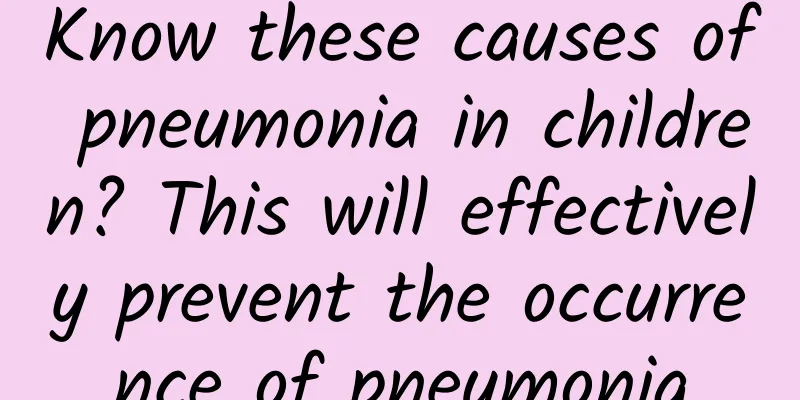What are the hazards of excessive jaundice in newborns?

|
Excessive neonatal jaundice may cause acute bilirubin encephalopathy or develop into kernicterus, which can cause brain damage or even endanger life in severe cases, so timely intervention is required. Effective management such as phototherapy, exchange transfusion therapy and drug therapy should be used to control bilirubin levels and reduce health risks. 1. Causes of excessive neonatal jaundice The main cause of neonatal jaundice is the accumulation of bilirubin in the body. Normal physiological jaundice is usually related to the incomplete development of the liver function of the newborn, resulting in insufficient bilirubin metabolism. However, if the bilirubin level exceeds the standard, the following may be the cause: Genetic factors: Congenital diseases such as Gilbert syndrome and glucose-6-phosphate dehydrogenase deficiency can affect bilirubin metabolism. Environmental factors: Lack of feeding after birth or insufficient breast milk intake may lead to a decrease in the ability to excrete bilirubin. Physiological and pathological factors: Traumatic hemolysis caused by delivery, maternal-fetal blood type incompatibility, or bacterial infections such as sepsis increase the risk of hemolysis, thereby causing a rapid increase in bilirubin levels. 2. The harm of excessive jaundice in newborns Acute bilirubin encephalopathy: If bilirubin enters the brain, it can have toxic effects on the central nervous system, manifesting as lethargy, weak crying, and even convulsions. Kernicterus: Long-term excessive bilirubin can easily lead to kernicterus, a very serious brain damage that can cause movement disorders, hearing loss, and even intellectual disabilities. Severe kernicterus can also be life-threatening. Sequelae: Some patients with unmanaged hyperbilirubinemia may develop neurodevelopmental problems such as inattention and delayed language development in the later stages. 3. Treatment of excessive neonatal jaundice Phototherapy: This is a safe and common treatment method that breaks down bilirubin through exposure to special blue light, speeding up its excretion. Exchange transfusion: For severe hyperbilirubinemia, your doctor may consider exchange transfusion to quickly lower bilirubin levels by replacing fresh blood. Drug treatment: Surfactant or intravenous immunoglobulin can be used to reduce the risk of hemolysis and promote bilirubin metabolism. Dietary adjustments: Increase the frequency of breastfeeding to help babies excrete metabolic waste faster and improve the excretion efficiency of bilirubin. We should pay great attention to neonatal jaundice. Early detection and intervention can effectively avoid potential complications. Parents should closely observe changes in the skin color of newborns. If they find that the jaundice is gradually getting worse or accompanied by abnormal symptoms such as drowsiness and weak crying, they should seek medical attention immediately to ensure the healthy and safe growth of the baby. |
<<: What medicine can cure pneumonia and bronchitis in children quickly?
>>: What to do if you feel flustered, short of breath, and weak
Recommend
Is childhood eczema contagious?
Pediatric eczema is not contagious because it is ...
How to treat a child with a white tongue coating and cough? A child with a white tongue coating and cough is probably suffering from internal heat.
If a child develops adverse symptoms such as whit...
How to determine the cause of acute laryngitis in children
The main causes of acute laryngitis in children i...
Why does my baby cough while sleeping? What should I do if my baby coughs while sleeping?
When a baby has symptoms of coughing while sleepi...
Comprehensive examination of diarrhea in children
In life, pediatric diarrhea is a common disease, ...
What to do if baby has phlegm in throat
In autumn, colds and coughs may occur due to exte...
What does low HBA mean?
What does low HBA mean? In simple terms, low HBA ...
Can acute laryngitis in children be cured?
Acute laryngitis in children is common in this se...
Can I take Yinzhihuang if I have severe jaundice?
When the infant has high jaundice, Yinzhihuang ca...
Routine examination for diarrhea in children
Diarrhea is a disease that often occurs in daily ...
Medical treatment for children with late-stage renal disease
What are the symptoms of late-stage nephrotic syn...
What is Alkaline Phosphatase
Alkaline phosphatase is an enzyme found in multip...
What tests do children with eczema need to do?
What kind of examinations do children with pediat...
Can children with diarrhea take Enteritis Ning?
Children with diarrhea can use Enteritis Ning und...
What is the best treatment for tics? What are the causes of tics?
At present, the main clinical treatment for tics ...









